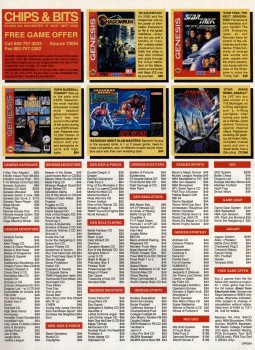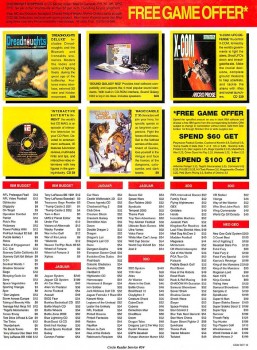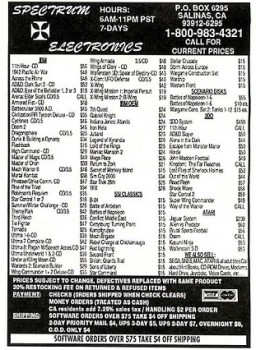Page 1 of 2
Trip Hawkins gives an interview
Posted: Tue Jun 19, 2012 9:17 pm
by 3DOKid
Posted: Sun Jun 24, 2012 8:06 pm
by 3DO Experience
The Meat:
The article has lots of info & history in it but for those who want just the 3DO meat of it here you go.
(oh and there is a little more on 3DO but you'll have to read the whole thing for that)
Ramsay: Fast forward to 1991. Why did you leave EA?
Hawkins: I didn't feel like I was leaving EA, but it turned out that way. From 1988 to 1990, I did my most transformative work at EA, led by a radical strategy to enter the console game business by reverse engineering a new and unproven platform. In 1988, Tengen reverse engineered and sued Nintendo. I watched that situation unfold to Tengen's ultimate detriment.
At the same time, Sega released the 16-bit Sega MegaDrive, which was later branded as the Genesis, in Japan. I really liked this machine and investigated a strategy of reverse engineering it. Doing so would allow EA to have publishing freedom on the platform, which would probably be released in the US in 1989 and Europe in 1990. EA already had great 16-bit brands and technology that could easily move to the Sega Genesis.
We moved forward, had it figured out in 1989, and had products ready to go in 1990. I then went back to Sega and made a huge strategic deal that made us good partners. The deal would also prove to save EA $35 million in licensing fees and catapult our market cap from $60 million to $2 billion in a two- to three-year period. Once that was all in the bag and well underway, I was still very concerned about future platforms for EA.
I worried that Nintendo and Sega would take steps to make it harder for EA to have freedom in the future. Sony had not yet entered the game business and the PC was completely dead as a game platform at that time. I concluded that it was time for EA to take a more active role on the platform side—perhaps not to the same degree as Microsoft or Sega, but in some way that we could drive market expansion and publishing freedom. I wanted to see consumers and developers get the chance to have 3D graphics, optical disc storage, and networking.
This effort began with an internal skunkworks, but took on a life of its own. I couldn't resist the temptation to spin it out and organize it as a "Dolby Sound"-type licensing model called 3DO. From 1990 to 1994, I was chairman and the largest stakeholder of both companies; however, the two companies gradually pulled apart due to conflicting priorities and agendas.
Ramsay: How did you feel about leaving behind something you created?
Hawkins: I was like the father of a rebellious teenager and an infant having open-heart surgery. I felt obligated to care for the infant and knew that the teen was going to make it to adult life. 3DO was in business for 12 years and twice reached revenues of up to the $100 million level.
For a variety of reasons, 3DO was not sustainable. I made a lot of mistakes and many of the ideas were too far ahead of their time. I was sad to become estranged from EA because it was my baby. I had always admired Walt Disney as a role model and the fact that he was with his company until the day he died. I regret the misadventure, but I take full responsibility.
Life tests and develops our character, hopefully into something better over time as we learn and understand what is right and true. One thing I do know is that it was somewhat inevitable that I would do something like 3DO because I was trying too hard to push the envelope in those days. I think many of us as younger entrepreneurs are trying to find out exactly who we are and where our edges are, and you don't know where the edges really are until you fall off a few times.
Ramsay: Platform manufacturers not only compete by publishing their own games; they benefit from hardware licensing and third-party properties. Is this business really that lucrative? Or are there hidden costs?
Hawkins: Investors like to play monopoly so they like platforms, but many platforms fail and many are capital-intensive. In reviewing history, game consoles are now apparently among the riskiest of platform businesses. To be successful, you need custom chips, high manufacturing volume, and tons of marketing. The pace of technology is also very fast and new models can quickly become obsolete. Nintendo is the only company in that sector that has been consistently successful over a long period.
Ramsay: Why wasn't 3DO sustainable? What were the mistakes?
Hawkins: For starters, 3DO was more than $1 billion short on the capital requirements. Licensed technologies like Dolby sound, Flash, HTML, or MPEG can gradually sneak up on the market, penetrating more devices and platforms over time and becoming de facto standards. This is because the hardware is selling for another reason and the emerging technology is only an additive. I might buy a tape cassette recorder because I want to record songs or buy music tapes, and I don't even have to know or care that the Dolby sound is an option. It is completely different with game consoles, especially in those days where it was winner-take-all.
A new game console would only succeed on the basis of new games using its new features. Backward compatibility would not drive its success; it had to have new, state-of-the-art games. It turns out that to make a new console good enough to achieve this and to win support from enough good developers, it takes more than $1 billion to build it out and convince others to jump in. Sony committed more than $2 billion, and not only beat 3DO but pushed aside larger and stronger competitors like Sega and Nintendo.
Sony, Nintendo, and Sega also had strong brand power and great lineups of first-party games. Mario is only on Nintendo and Sonic was only on Sega. 3DO could lead off with Madden and Road Rash, but as fast as they could, EA put those games on Sega, Nintendo, and Sony. Ultimately, the low license fees for 3DO didn't matter. Developers were willing to overpay Sony because they believed in Sony's strength in building the market.
A great deal is made of 3DO's high hardware price, but this mistake is overrated. First of all, the initial street price was $599, not higher myths that are often reported. Within a few months, I negotiated with Panasonic to bring the price down to $499, which was, by the way, Sony's introductory price the next year in Japan. Sony was very aggressive when they later entered the United States at $299, but by that time, 3DO's price was $349. 3DO would have done better at lower prices, but Sony won and also beat Nintendo and Sega for a variety of these other reasons.
He goes on to talk about other endeavors and even makes a mention that a 3DO game could have as many as 16 players! So that's a question finally answered.
Posted: Sun Jun 24, 2012 9:25 pm
by Lemmi
3DO Experience wrote:The Meat:
A great deal is made of 3DO's high hardware price, but this mistake is overrated. First of all, the initial street price was $599, not higher myths that are often reported. Within a few months, I negotiated with Panasonic to bring the price down to $499.
i call bullshit on this, it was $699
Posted: Mon Jun 25, 2012 4:20 pm
by Trev
Lemmi wrote:3DO Experience wrote:The Meat:
A great deal is made of 3DO's high hardware price, but this mistake is overrated. First of all, the initial street price was $599, not higher myths that are often reported. Within a few months, I negotiated with Panasonic to bring the price down to $499.
i call bullshit on this, it was $699
Hmmm ... I was wondering about this also ... perhaps Trip's memory is slightly off (it has been 20 years)
Posted: Mon Jun 25, 2012 7:13 pm
by Austin
Trev wrote:Lemmi wrote:3DO Experience wrote:The Meat:
A great deal is made of 3DO's high hardware price, but this mistake is overrated. First of all, the initial street price was $599, not higher myths that are often reported. Within a few months, I negotiated with Panasonic to bring the price down to $499.
i call bullshit on this, it was $699
Hmmm ... I was wondering about this also ... perhaps Trip's memory is slightly off (it has been 20 years)
Yeah, or he's completely aware of it and is attempting to re-write history. Too bad the damage has already been done!

Posted: Mon Jun 25, 2012 7:55 pm
by 3DOKid
With or without a game? Remember that old chestnut?
Posted: Mon Jun 25, 2012 10:31 pm
by dave4shmups
Lemmi wrote:3DO Experience wrote:The Meat:
A great deal is made of 3DO's high hardware price, but this mistake is overrated. First of all, the initial street price was $599, not higher myths that are often reported. Within a few months, I negotiated with Panasonic to bring the price down to $499.
i call bullshit on this, it was $699
I thought only the Neo Geo AES sold for that much.

At any rate, the rest of the interview is definitely worth reading through. I recall another interview, where the person asked Hawkins if he'd ever get into the console business again, and he acted embarrassed about the 3DO. Which he should never be, IMO, because it's an awesome console!

Posted: Fri Jun 29, 2012 2:58 am
by Martin III
I pretty much just skimmed down to the 3DO stuff myself - good reading. Trip's thoughts on making it in the console business are unpleasantly true. I've really got to get down to reading the meat of the interview... might as well do that now.
Posted: Mon Jul 02, 2012 6:26 pm
by NikeX
Trip Hawkins:
Life tests and develops our character, hopefully into something better over time as we learn and understand what is right and true
Forbes:
Trip Hawkins of abusive tax shelters in an effort to pay zero percent capital gains tax on sales of shares in his wildly successful Electronic Arts
http://www.forbes.com/sites/williampbar ... -shelters/
Posted: Wed Jul 04, 2012 4:25 am
by 3DO Experience
Oh god, not this again...
initial street price was $599
Posted: Thu Jul 12, 2012 9:08 pm
by Sham66
I remember a $699 launch price too.
Although the Wikipedia states "3DO's high price: US$599 at launch".
So maybe some stores sold it at $599 and others had $699.

Posted: Thu Jul 12, 2012 9:30 pm
by sneth
Maybe $699 was Canadian price? Conversion rate was not as great back then.
Re: initial street price was $599
Posted: Fri Jul 13, 2012 3:11 am
by Martin III
Sham66 wrote:I remember a $699 launch price too.
Although the Wikipedia states "3DO's high price: US$599 at launch".
Wikipedia isn't a primary source, and is subject to change at any time. An editor changed that article from "$699" to "$599" just a few months ago. I haven't reverted it because I'm not enough of a 3DO expert to have a good source identifying the launch price right at hand, nor can I be sure the source the editor used is unreliable. But I am rather skeptical that it would have been so widely accepted that the launch price was $699 if it was actually $599. Launch prices aren't like sales figures, where you need to combine estimates across multiple markets, and biased researchers can easily skew the numbers. It's just one indisputable number.
Posted: Fri Jul 13, 2012 3:29 am
by 3DO Experience
I think it's very possible that the system cost $599 but since there was an incorrect press release (before it came out) stating $699 all the magazines printed that price. And do to there being almost two decades since it came out our memories have been attuned to the price that we read over and over. Unless someone still has their receipt we might never be sure.
Posted: Fri Jul 13, 2012 2:42 pm
by 3DOKid
3DO Experience wrote:I think it's very possible that the system cost $599 but since there was an incorrect press release (before it came out) stating $699 all the magazines printed that price. And do to there being almost two decades since it came out our memories have been attuned to the price that we read over and over. Unless someone still has their receipt we might never be sure.
I'm inclined to agree. I have a launch day magazine, printed in the UK, states the price was $599.
RRP is obviously Recommended Retail Price. Emphasis on the
Recommended. Vendors (manufacturers) can't 'fix' the price. They really frown on that. Retailers are free to charge what they want. I guess an exciting bit of kit like 3DO could justify an extra $100 mark-up ...?
Posted: Fri Jul 13, 2012 10:54 pm
by outrun2sp
I'm a little surprised that members of forum called 3DO Zone don't even know the launch price of the 3DO, the system was released in early October in 1993 in America, the price was $699, not $599.
Trip Hawkins is 100% lying!!
Posted: Sat Jul 14, 2012 12:39 am
by Trev
outrun2sp wrote:I'm a little surprised that members of forum called 3DO Zone don't even know the launch price of the 3DO, the system was released in early October in 1993 in America, the price was $699, not $599.
Trip Hawkins is 100% lying!!
Isn't that what most of us have said? In any case, we are in the process of collecting concrete proof, rather than 19 year old memories and wikipedia articles.
Welcome to the forum btw.
Posted: Sun Jul 15, 2012 3:28 am
by swaaye
A little digging through old magazines seems to reveal that it went $700 >$600 > $500 > $450.
$699 December 1993 issue of EGM.

$699 March 1994 of Gamepro
(lower right corner)

$599 May 1994 Gamepro

$499 July 1994 Gamepro

$450 in October 1994 of Computer Gaming World

$450 again in same issue

Posted: Sun Jul 15, 2012 3:44 am
by Austin
Ahahaha.. "Chips & Bits". I remember them. If I remember correctly, they posted off-the-wall "coming soon" games that probably weren't even real, like Virtua Fighter 2 on the 32X.
Posted: Sun Jul 15, 2012 3:59 am
by swaaye
Austin wrote:Ahahaha.. "Chips & Bits". I remember them. If I remember correctly, they posted off-the-wall "coming soon" games that probably weren't even real, like Virtua Fighter 2 on the 32X.
Yeah unfortunately there are few big retailers in these mags and sometimes they didn't put prices in.
Posted: Sun Jul 15, 2012 4:11 am
by Trev
Austin wrote:Ahahaha.. "Chips & Bits". I remember them. If I remember correctly, they posted off-the-wall "coming soon" games that probably weren't even real, like Virtua Fighter 2 on the 32X.
First thought that crossed my mind.

Appreciate seeing the scans swaaye
Posted: Sun Jul 15, 2012 4:23 am
by Austin
Trev wrote:Appreciate seeing the scans swaaye
Yeah, likewise. I haven't had a peek at an old GamePro in a long, long time. It was like a trip down memory lane.

Posted: Sun Jul 15, 2012 8:45 am
by 3DOKid
I love looking at these old adverts

Does look like $699 was the price. So, why does Trip stick to the $599 price? I imagine, working for a hardware vendor myself, he fought hammer and tongue to get the price down.
Posted: Sun Jul 15, 2012 12:12 pm
by outrun2sp
3DOKid wrote:I love looking at these old adverts

Does look like $699 was the price. So, why does Trip stick to the $599 price? I imagine, working for a hardware vendor myself, he fought hammer and tongue to get the price down.
Who fought ??
Posted: Sun Jul 15, 2012 4:25 pm
by 3DO Experience
CONGRATS! You've just won the "Who's Trip Hawkins?" Award!
Posted: Sun Jul 15, 2012 4:35 pm
by 3DOKid
outrun2sp wrote:3DOKid wrote:I love looking at these old adverts

Does look like $699 was the price. So, why does Trip stick to the $599 price? I imagine, working for a hardware vendor myself, he fought hammer and tongue to get the price down.
Who fought ??
My dad, you f**ker. Insensitive git.
Posted: Sun Jul 15, 2012 4:40 pm
by 3DO Experience
Now now.... saying things like that is why people say we are jerks.
Posted: Sun Jul 15, 2012 4:42 pm
by 3DOKid
What would Trip Hawkins have to gain from lying? So frequently, so often and for no apparently good reason? 20 years, after the event?
Posted: Sun Jul 15, 2012 4:49 pm
by 3DOKid
Definitely $699
This is a message from December 1993 talking about the Costco selling them cheaper: $599.
https://groups.google.com/forum/?hl=en& ... teNlyw06IJ
Posted: Sun Jul 15, 2012 5:04 pm
by 3DO Experience
But in Trip's defense that doesn't mean that the real MSRP was $599, it just means that sellers went with the $699 misprint. However I would think they might try to sell more consoles by going with $599 rather than try and squeeze an extra $100 out of people, but I'm not in the retail business and would try to keep prices down if I were.